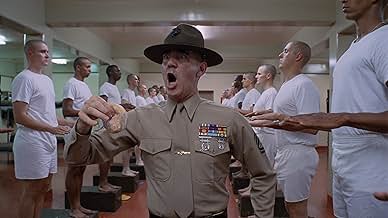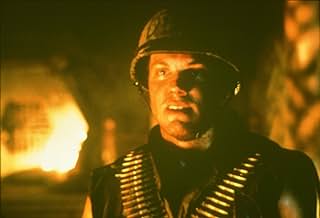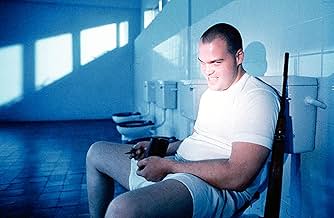Un marine américain pragmatique observe les effets déshumanisants de la guerre du Vietnam sur ses camarades recrues, de leur entraînement violent du camp militaire jusqu'aux combats de rue s... Tout lireUn marine américain pragmatique observe les effets déshumanisants de la guerre du Vietnam sur ses camarades recrues, de leur entraînement violent du camp militaire jusqu'aux combats de rue sanglants à Hue.Un marine américain pragmatique observe les effets déshumanisants de la guerre du Vietnam sur ses camarades recrues, de leur entraînement violent du camp militaire jusqu'aux combats de rue sanglants à Hue.
- Réalisation
- Scénario
- Casting principal
- Nommé pour 1 Oscar
- 8 victoires et 15 nominations au total
- Gny. Sgt. Hartman
- (as Lee Ermey)
- Doc Jay
- (as John Stafford)
- Da Nang Hooker
- (as Papillon Soo Soo)
Résumé
Avis à la une
First of all I love Kubrick's work, so I came into this with a bias. However I have seen a lot of action and war films, and this one, to an individual who never went to war, seems the most true-to-life, taken as a whole. This IS how you have to look at this film, incidentally; trying to break it down into two or three parts and say which was better is missing the point of the film, I think.
In the same way that "Trainspotting" was an anti-drug film that did not gloss over anything, "Full Metal Jacket" is (for me) an anti-war film that stares straight at the ugliness of war and the potential for violence within almost all people, especially those trained, conditioned, even twisted, into military roles, without preaching even a single time. Less allegory and more applicability! Wonderful!
The camera work was superb. I felt like I was walking through the movie with the Marines, from the barracks to the battlefield scenes.
I have seen others criticize this film for the voice over, but I felt that it was used sparingly, and was helpful, not overdone. The narrator doesn't say anything that seems out-of-place.
Others have commented on the music, the acting, and so on, so I won't add my repetitive comments, except that the drill sergeant is perfect!
The combination of the demented treatment the recruits receive in boot camp with the combined "hours of boredom, seconds of terror" feel of the Vietnam scenes is intense and not for everyone, but feels REAL.
10 out of 10, perfect.
For the most part Kubrick got Parris Island right on the money. And why shouldn't he have, since his screen DI, Lee Ermey was in fact a real DI before he started acting (he played another DI in "The Boys of Company C," an earlier and lesser Vietnam flick)? He had a built- in technical adviser. The screams and insults and profanity and physical punishment were all part of the DIs armamentarium. When you're facing up to 75 young strangers you need to immediately establish absolute authority and hang on to it for 13 weeks. Furthermore, you want to break the breakable as soon as you can. My platoon had its Private Pyles and though none ended up as he does in "Full Metal Jacket," I remember that they simply disappeared from our ranks, never to be heard from again. Nothing Ermey as Sgt. Hartman does is exaggerated.
Kubrick, however, does exaggerate. Speaking of Pyle's ending, it's almost impossible for me to imagine that a recruit could manage to sneak a clip of live rounds away from the rifle range. Every shooter at the range has his own rifle coach, and every single round is very carefully accounted for. Kubrick started the killing one scene too early.
I've read that DIs nowadays are forbidden to use the time-honored f-word, and are not allowed to lay hands on recruits. I don't know if that's good or bad for training (I had my face slapped hard my first day of boot camp and that was just for openers), but then all of us old-timers like to brag about how tough it useta be!
A final note: It's interesting to compare "Full Metal Jacket" to another attempt at a portrayal of Parris Island, Jack Webb's "The DI," made around '55 or '56. Webb tries for authenticity, but as I was to learn a year or so later, his PI was a boy scout camp.
There are no villains in this film, only heroic victims. The villains are all off-screen, comfy behind mahogany desks, or dressed for success and giving shrill speeches about how maintaining peace requires war. Strange logic.
First it's boot camp, a dreary prospect at best, for an ordinary group of young American men. Here, a sadistic drill Sargent, in colorful language, barks out orders and insults straight from Hades. It's do or die, almost literally, for our greenhorns. It's an ordeal of blackness from which some may never recover. Still, the grunts learn a valuable lesson; namely, that life is mostly physical, not mental. It's a lesson some ivory tower college professors never learn.
But then it's on to an even blacker black ... Vietnam. Combat scenes are rendered believable by effective visuals and terrific sound effects: pounding percussion, amplified sounds of equipment and footsteps across explosive debris, and an always present, ever-so-subtle ... echo. Potent and torturous, these scenes convey a Zen-like immediacy, an impending sense of doom. And then at film's end, those lyrics ...
Composed of two, barely overlapping, parts, the script's structure is a bit unorthodox. But the film works, owing to an intensity that never lets up. R. Lee Ermey is of course terrific as the harsh drillmaster. Casting of the young lions is okay, though a tad weak in one or two cases. Insertion of pop songs of the era works well, to amplify the cultural disconnect between a war-torn Vietnam and an indifferent America.
Like reading a history book, watching an occasional war movie is good for the soul. It puts one's problems in perspective. For that reason, this particular war movie is better than most. It's riveting, intense. And the sense of impending blackness hovers ever present over the story's heroic victims, like the sword of Damocles.
It really is a film of two halves, unfortunately I didn't like the 2nd half.
The 1st half at boot camp was excellent, we saw a lot of character development and emotion as well as a lot of humour and really serious issues. R. Lee Ermey and Vincent D'Onofrio were just brilliant.
The 2nd half I didn't enjoy as much, it looked great and there was a lot of action but it was just a bit boring and felt really dragged out, whereas the 1st part just had everything that you wanted.
Glad I got round to seeing it but wouldn't watch it again, slightly disappointed after a really good start to the film.
6/10.
Le saviez-vous
- AnecdotesIn the first part of the movie, in the sequences inside the barracks during the drill, a special lens was designed to keep every single Recruit in focus. Director Stanley Kubrick intended that no one was special and they all had the same treatment.
- GaffesOn several occasions, the word "repeat" is used while speaking on the radio. In the Marine Corps, the use of the word "repeat" on the radio is reserved solely for talking to artillery units to request a repeat of the last fire mission. The term used would be: "say again your last" or "I say again."
- Citations
[first lines]
Gunnery Sergeant Hartman: I am Gunnery Sergeant Hartman, your senior drill instructor. From now on you will speak only when spoken to, and the first and last words out of your filthy sewers will be "Sir". Do you maggots understand that?
Recruits: [In unison in a normal speaking tone] Sir, yes Sir.
Gunnery Sergeant Hartman: Bullshit, I can't hear you. Sound off like you got a pair!
Recruits: [In unison, much louder] SIR, YES SIR!
Gunnery Sergeant Hartman: If you ladies leave my island, if you survive recruit training, you will be a weapon. You will be a minister of death praying for war. But until that day, you are pukes. You are the lowest form of life on Earth. You are not even human fucking beings. You are nothing but unorganized grab-asstic pieces of amphibian shit! Because I am hard, you will not like me. But the more you hate me, the more you will learn. I am hard but I am fair. There is no racial bigotry here. I do not look down on niggers, kikes, wops or greasers. Here you are all equally worthless. And my orders are to weed out all non-hackers who do not pack the gear to serve in my beloved Corps. Do you maggots understand that?
- Crédits fousEnd credits list a song performed by Sam the Sham and The Pharaohs, misspelling the last word as "Pharoahs." This has not been corrected on any home video version of the movie.
- Versions alternativesOriginally the song Paint it Black played at a higher speed and higher pitch during the end credits but starting with the 2001 DVD re-release, whenever the movie was remixed to 5.1 (from mono) it was "corrected" to where it plays at the regular speed and pitch instead.
- ConnexionsEdited into Commercial Entertainment Product (1992)
Meilleurs choix
Détails
- Date de sortie
- Pays d’origine
- Langues
- Aussi connu sous le nom de
- Cara de guerra
- Lieux de tournage
- Isle of Dogs, London, Greater London, Angleterre, Royaume-Uni(Da Nang scenes)
- Sociétés de production
- Voir plus de crédits d'entreprise sur IMDbPro
Box-office
- Budget
- 30 000 000 $US (estimé)
- Montant brut aux États-Unis et au Canada
- 46 357 676 $US
- Week-end de sortie aux États-Unis et au Canada
- 2 217 307 $US
- 28 juin 1987
- Montant brut mondial
- 50 875 563 $US









































